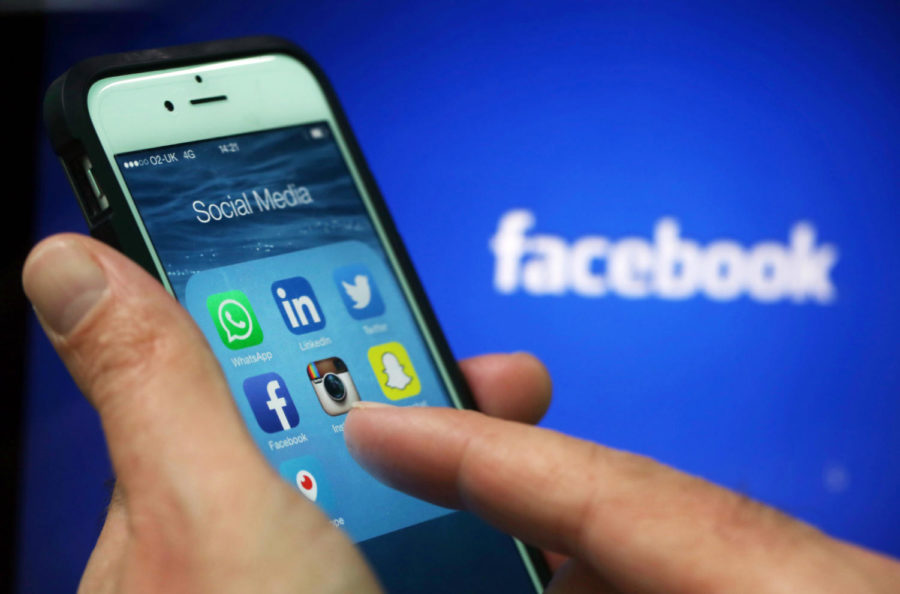Facebook in the News
Social media apps including WhattsApp, LinkedIn, Twitter, FaceBook, Instagram, SnapChat and Periscope are displayed in a social media folder on the screen of an Apple Inc. iPhone 6 in this arranged photograph taken in London, U.K., on Friday, May, 15, 2015. Facebook Inc. reached a deal with New York Times Co. and eight other media outlets to post stories directly to the social network’s mobile news feeds, as publishers strive for new ways to expand their reach. Photographer: Chris Ratcliffe/Bloomberg via Getty Images
May 21, 2018
Why is Facebook in the news?
The recent scrutiny of Facebook is a direct result of the presidential election. Russians used Facebook to try to divide the US public. Cambridge Analytica also used Facebook to collect data in order to advise their political candidate customers. People are concerned about what happened. Their attention has been turned to Facebook, what its responsibility is, and they have begun to question some of its principles. That said, everything Facebook did appears to be legal.
What is there to be concerned about?
There are many issues regarding Facebook’s behavior are concerning. But, it may be more concerning that:
- Facebook employees did not apparently know of or apprehend and deal with these issues earlier
- People’s attention will now continue to be diverted, dispersed, and dissipated
- The scandal will pass without acknowledging what inspired it.
Despite the rumor and all the apparent error, even if lawmakers were to do something which would respond to people’s concerns and lead to substantive change, Facebook would not be prosecuted for actions that were legal in the past.
What is happening on Facebook?
Ultimately, Facebook dictates the rules around the content uploaded to its website. Some things are private and others are not. The user has the option to select, for some of those things, which are or are not in the privacy settings. For example, Facebook messages are private.
Facebook uses the user’s information in its algorithms to “personalize your online experience.” Surfing the web, users can see ads “personalized” by their input and can follow them. Facebook uses algorithms that categorize the user data in order for Facebook to target the user’s feeds and ads. These user “audiences” can be accessed by scrolling down the create ad section on Facebook. Facebook, determined to have users’ time on their platform, use a multitude of techniques to get to their users. Some of their techniques exploit psychology, but there are many others. All of these actions and mechanisms ensure Facebook’s objective of maximizing user output.
What can organizations do on Facebook?
Parties can use Facebook’s tools like the categories and information created for ads for their own interests, and can then benefit from the Facebook users for themselves. These parties may also use Facebook services on their own websites to collect data on users. In theory, anyone can target users based on the categories that Facebook has provided. Parties may already access Facebook’s public information and, furthermore, they can ask permission to access user profiles. Using Facebook, the Russians created profiles and ads to spread their information. What Cambridge Analytica did was get access to user profiles and through those profiles access a web of data on those users’ friends profiles. But, Facebook imposes limiting factors on its services as far as it it corresponds to the company’s own interests. Facebook intends to control how data from its site is used.
How does Facebook’s platform impact people and especially developing generations?
Facebook is a for profit company. It makes money enticing its users to spend more time on the platform and buy from its advertisers. However, these goals of Facebook do not correlate with developing and maintaining productive behaviors. At the very least, Facebook takes time away from things which are actually productive. Granted, people can “win” some using Facebook services “for free.” Note, Facebook, certainly, despite being “free,” does not nearly run on a loss. There are many more people who are vulnerable, often unconsciously, to Facebook, which does not mind exploiting them for profit. Those in the most precarious position are the youth. Undirected, they are enticed to fall to social media, using different platforms conspicuously. This phenomenon deprives society’s youth of meaningful experiences and learning. The evidence of the negative effects of Facebook is everywhere — see what a former Facebook executive has to say. Yet somehow, the situation is remains unchanged and people are (apparently) unaware. People need to realize these issues, which are not limited to Facebook, and respond to them.






